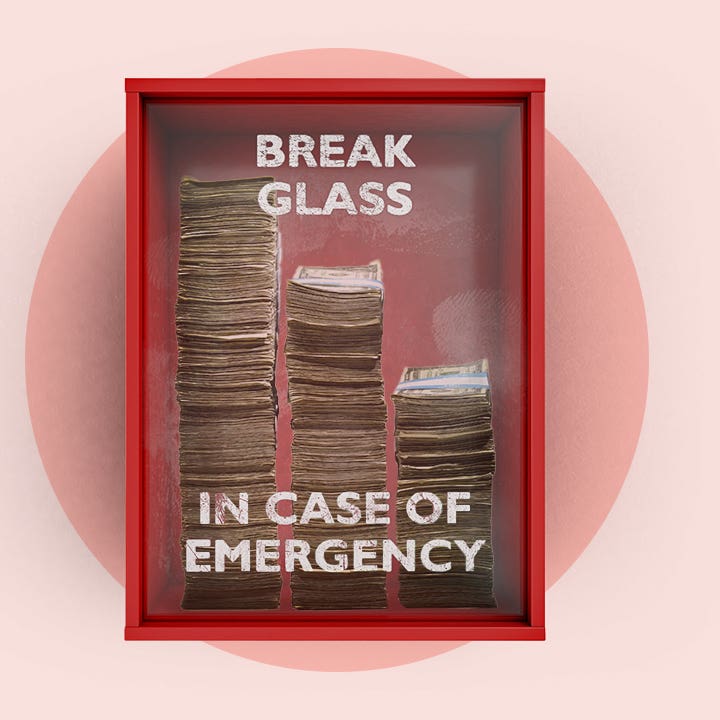How to spot personal loan scams and protect your finances




Key takeaways
- Technology is making it easier for scammers to defraud consumers out of billions of dollars with different types of schemes.
- Lenders that guarantee loan approvals for an upfront fee are the most common sign of a personal loan scammer.
- Consumers with lower incomes and poor credit are more likely to be targeted by scammers.
- If you suspect a fraudulent lender has tricked you, stop communicating with the lender and freeze any related bank accounts, credit cards or debit cards.
Consumers lost over $12.5 billion dollars to frauds and scams in 2024, according to the Federal Trade Commission. Fraudulent bank transfers, cryptocurrency scams and investment scams were among the most common culprits.
Recent budget cuts to the CFPB (Consumer Financial Protection Bureau) could lead to more bad players in the financial markets, putting more pressure on state regulators to step up their watchdog efforts. If you’re searching for a personal loan, start by familiarizing yourself with the red flags and knowing how to vet potential lenders to avoid scams.
10 red flags of loan scams to watch out for
With financial scams increasing and less federal supervision of financial institutions by the CFPB, it’s more important than ever to do your due diligence and look for potential signs of fraud. Watch out for these ten red flags of potential personal loan scams.
1. The lender says approval is guaranteed
Scam lenders may advertise guaranteed approval with no credit check or insist that bad credit is no problem, but guaranteed approval is a major red flag. Legitimate lenders can’t approve loans until after a thorough review of your financial details. If a lender hasn’t vetted your credit history and income, it has no way of determining if you can repay the loan.
Guaranteed approval loan scams are typically geared toward consumers with poor credit histories or financial difficulties. Scammers know that borrowers with bad credit struggle to qualify for loans, but the promise of definite funding is often a ruse to get sensitive personal information from them.
2. The lender charges upfront fees
Legit loan companies don’t charge upfront fees. Ever. Some try to justify upfront costs by calling them “processing” or “insurance” fees. Others might pressure you to pay the first and last months’ payments or a certain percentage of the total loan.
Reputable personal loan lenders subtract fees from your approved loan amount. Any fees the lender charges should be clearly stated in your loan contract. All of your fees should be the same on the paperwork you sign as they were at final approval. Watch for extra fees like funding, closing or administrative fees that weren’t originally disclosed. If a lender pressures you to sign papers with more fees than you expect, you always have the right to cancel.
An origination fee is a common (and legitimate) cost associated with personal loans. This administrative fee may be as much as 12 percent of your loan amount and is deducted before your loan is disbursed.
3. The lender pressures you to apply now
Scammers often use pressure and urgency to convince people to act immediately without enough information. Personal loan rates don’t typically change overnight, and legitimate lenders don’t pressure customers to take out any type of loan.
While lenders might run limited-time promotions to attract customers, they typically give people the time and information they need to weigh their options carefully. There certainly won’t be consequences if you don’t apply immediately, like higher interest rates or loss of eligibility for future loans.

The best emergency loans of 2025
If you need access to quick cash to cover an unexpected expense, avoid the scams and explore Bankrate's expert picks for the best lenders for emergency loans.
Learn more4. The lender contacts you first with an offer
In the current age of technology, it’s not uncommon for a mobile or online personal loan search to lead to pop-up ads. While they may be annoying, they are typically harmless ads from different lenders to get your attention — the same as any mailer you’d receive for a preapproved loan.
Receiving an unsolicited loan offer, however, is a warning sign of a potential scam. Any offer should come as a direct result of you initiating contact through some type of online application. Legit loans are made by companies that seek your business through ads that encourage you to apply, and any offer you receive should only come after you submit an application.
5. The rate and terms look too good to be true
Legitimate lenders always tailor personal loan terms to your credit score, income, employment history and other factors to determine how much you can realistically repay. While there are legitimate lenders that work with bad credit borrowers, the best personal loan rates, the highest loan amounts and the longest terms are typically reserved for borrowers with good credit.
On the other hand, scam lenders may create “clickbait rates” to get unsuspecting borrowers to provide personal information. Alternatively, you might get a robocoll with a conversational voice leaving you a recording of how they just met with the loan committee and decided to offer you an absurdly high loan amount — often in the tens of thousands of dollars.
6. The lender has no contact information
Scammers often avoid listing contact information, making it challenging to get your money back once the relationship turns sour. They often contact you from phone numbers that can’t be called back or from emails that aren’t branded with a company name. If they do provide contact information, they may ask you to contact them in unusual ways, such as messaging apps.
A personal loan lender on the up-and-up will have a website with contact information, will only send you emails with clearly branded company information and will typically provide an app or website help page with information for you to reach out with inquiries or concerns.
7. The lender has no physical address
Some lenders may provide only a P.O. Box address or no address at all. A lack of a physical address is a significant red flag when evaluating a potential lender. However, don’t necessarily trust a company just because they have a physical address — scammers can often create fake accounts that make it look like they are affiliated with a legitimate company.
These companies typically fall into the “no contact information” category and should be avoided. There are so many legitimate personal loan companies with clearly identifiable addresses that it doesn’t make sense to do business with one that doesn’t publish its corporate or business address.
8. The lender isn’t registered in your state
Chances are pretty good that a company claiming to be a lender without a physical address or contact information won’t be registered to do business in your state. This is a violation of state law and a telltale sign of a scam. The same is true if a lender isn’t transparent about state licenses.
Legitimate lenders disclose their licensing information or will readily offer it when asked. But if you can’t find it, refer to your state attorney general’s website. Your state’s bank regulator should also have this information available.
9. The lender’s website seems suspicious
Criminals may create fake bank or lender websites that look similar to the real sites, hoping you give them your personal information without looking too closely. They also hack into lenders’ personnel files or email servers and create spoof emails claiming to be employees of a lender.
You should always make sure that any website that requests your personal or financial information is secure and properly encrypted. Call your lender if you’re contacted by someone new during the loan process. Look for indicators such as “https” (not just “http”) in the site address and a padlock icon in the browser bar signaling a secure connection.
10. You get an email with a last-minute request
Wire fraud has become a multi-billion-dollar problem for financial institutions. Be wary of any company asking you to wire or electronically send money via Zelle or Venmo. Funds lost due to fraud or theft aren’t recoverable under FDIC insurance laws. Remember: If a deal sounds too good to be true, it probably is.
In addition, many personal loan companies use direct access programs like Plaid to directly deposit funds into your account. These programs have built-in security that only gives legitimate lenders “read only” access to your accounts.
Bank account fraudsters may take advantage of this to convince you to give them full access to your accounts. If you’re unsure, always contact the lender’s general customer service line and ask for a fraud prevention specialist or supervisor to confirm the request.
How to vet potential lenders
Being vigilant and informed is the best way to avoid falling victim to a loan scam. If you get a personal loan by applying to reputable lenders yourself, you’re far less likely to get scammed than if you work with lenders that approach you. However, before submitting personal information to any lender, protect yourself by:
- Use a personal loan marketplace platform. You can find lenders on personal loan marketplaces. At Bankrate, the lenders we review are fully vetted and rated on a 5-star scale by our independent team of experts.
- Checking the lender’s online reputation. An online search can be one of the easiest ways to spot scams. Search the lender’s name alongside terms like “scam,” “fraud” or “rip-off” to reveal potential issues with the company.
- Confirming the lender’s state licenses. Legally, lenders must be registered and licensed in your state. The FTC suggests contacting your state attorney general or banking and financial services regulator to verify a lender’s registration if the company seems shady.
- Looking at unbiased reviews. Many reputable sites, including Bankrate, offer personal loan reviews. You can read about borrowers’ experiences before sharing any personal information.
What to do if you think you’ve been scammed
If you suspect that a fraudulent lender has tricked you, take the following steps as soon as possible to protect yourself from further harm and reduce potential losses:
- Stop communicating with the scammer. Do not reply to emails or messages the scammer sends, and do not make any more payments to the scammer.
- Keep a record of everything that happened. Write down everything that happened and keep copies of emails, texts and phone calls from the scammer. Put it all into an email that you send to yourself so you have a date-stamped account in case investigators need it.
- Call your bank immediately and freeze your account. Your bank can stop future debits and freeze your account from further charges. It may also be wise to freeze your credit score profiles and any credit card accounts you have.
- Take steps to secure your information. If you gave the scammer information that could be used to commit identity theft, such as your Social Security number, visit IdentityTheft.gov to determine your next steps.
- Report the company to the authorities. Gather detailed information and any evidence of the scam, then contact the Federal Trade Commission (FTC), the Consumer Financial Protection Bureau (CFPB) or local law enforcement agencies.
- Try to get a refund. If you paid the scammer, ask the bank or company you used to send the money if there’s a way to get the money back. They may give you something called a “provisional credit” to help you recover some funds while your account is investigated for fraud.
- Monitor your financial accounts. Monitor your bank accounts regularly for any suspicious activity or unauthorized transactions and consider placing a fraud alert on your accounts.
- Watch your credit report. Request free weekly copies of your credit reports from all three credit bureaus via AnnualCreditReport.com. Consider placing a credit freeze to protect yourself.
Bottom line
Personal loan scammers have creative ways to pressure you to take out loans that are very difficult to repay — or to hand over information that can be used for fraud. No lender can guarantee approval without reviewing your finances.
If you notice any of these red flags, don’t hesitate to walk away or contact authorities if you feel like someone is trying to scam you.
Frequently asked questions
Why we ask for feedback Your feedback helps us improve our content and services. It takes less than a minute to complete.
Your responses are anonymous and will only be used for improving our website.
You may also like

Should I get a personal loan? Here are the pros and cons

How to prequalify for a personal loan, and why it matters

7 personal loan mistakes that could cost you money

